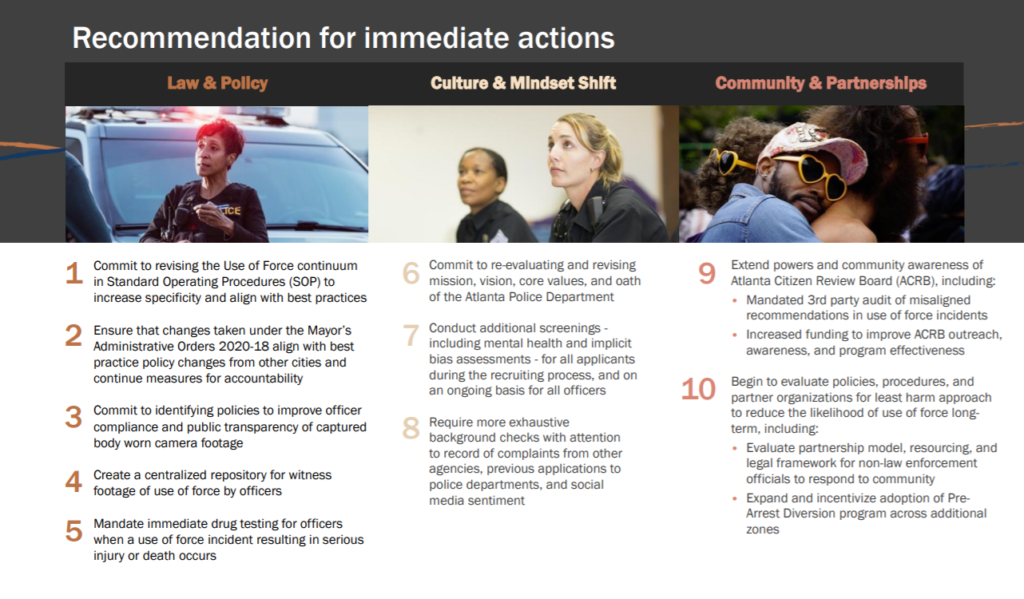Use of Force Advisory Council Releases Initial Recommendations
On June 4, Atlanta Mayor Keisha Lance Bottoms issued an administrative order creating a Use of Force Advisory Council, tasked with providing recommendations within 45 days after examining “…the City of Atlanta’s use of force policies and procedures” and addressing “issues of police violence, systemic racism, and the need for the transformation of our justice system.” 28 Advisory Council members, including SCHR’s Tiffany Roberts and Marissa Dodson, held weekly meetings and met with working groups to compile the recommendations within the allotted time. On July 22, the Council held a webinar to discuss their work.
Council co-chair and Gideon’s Promise founder Jonathan Rapping pointed to the need for a wholesale cultural change within the Atlanta Police Department — something that is not going to happen quickly.
“This was an opportunity to do more than address the most violent police encounters, but to address a world that creates these encounters,” said Rapping, “to try and push us to think about a long term commitment to a cultural transformation.”
The council’s recommendations include:
-revising the use of force continuum in APD’s Standard Operating Procedures
-mandating immediate drug testing for officers involved in an incident where serious injury or death occurs
-conduct additional screenings (including mental health & implicit bias assessments for applicants to APD
-require more exhaustive background checks, with special attention to record of complaints from other agencies, previous applications to police departments, social media posts

Council co-chair Tiffany Roberts, SCHR’s Community Engagement and Movement Building Counsel, led the Community Partnerships working group. In its recommendations, the group calls for opportunities to have a non-law enforcement response. “The idea of partnership honors the truth that people should be heard on what their needs are, especially people who live in police-saturated communities,” Roberts said.
Roberts reinforced the need to stand alongside communities demanding change: “Often we throw around terms like expert, as though people who have degrees on particular topics are experts in those fields. People who experience harm at the hands of any state actor are experts.”
There are responses that don’t require law enforcement at all, Roberts said, and these are opportunities for other partners to take the lead.
“We want to mandate alternate response training, to make officers better able to call in mental health professionals or housing and substance abuse services,” Roberts said. “We want there to be resources available so that jails are not crowded with people who need different kinds of support.”
The Council was formed hastily and had to work quickly to come up with solutions in the allotted 45 days, but now the City has its work cut out. Roberts said she hopes to see the recommendations bear fruit.
“My hope is that this is not a committee to nowhere, that we resist the urge to rest on our report and that we invest the time necessary to do so much more than the bare minimum.”
The Use of Force Advisory Council Recommendations community feedback survey will remain open until Wednesday, July 29: https://surveymonkey.com/r/67QXW7Z